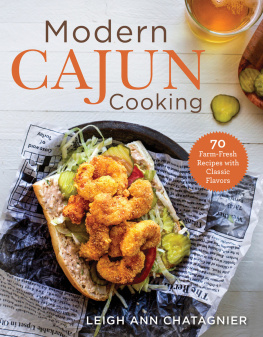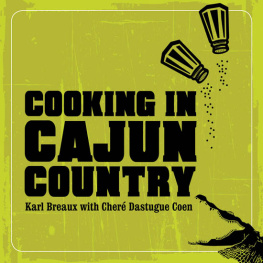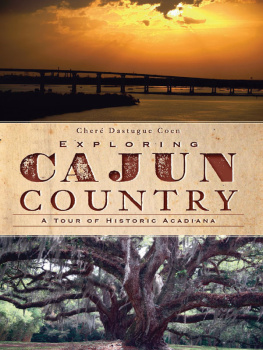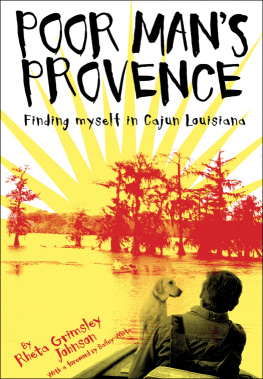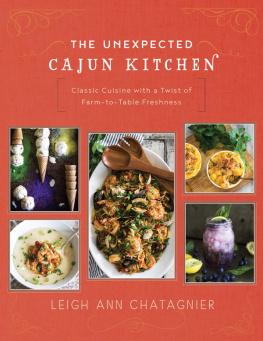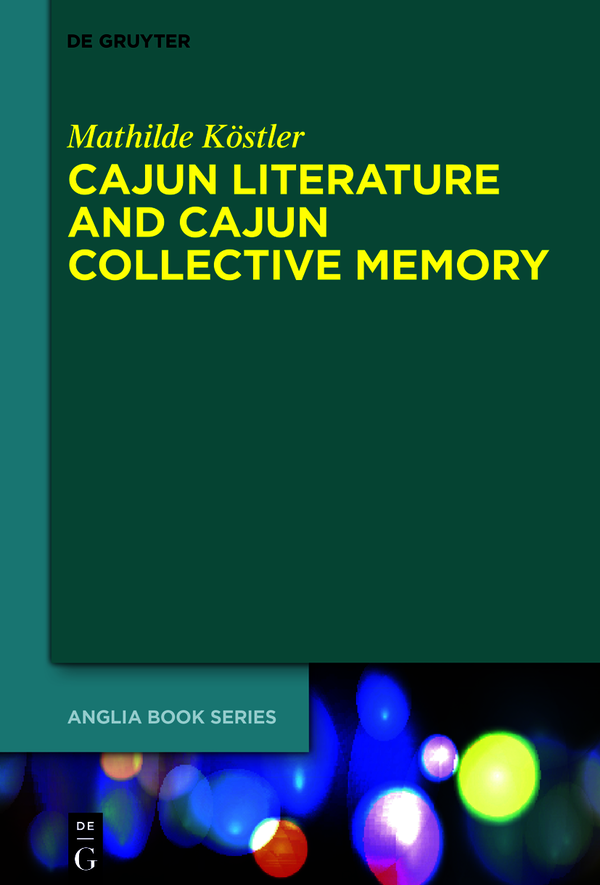Buchreihe der Anglia / Anglia Book Series
Edited by
Andrew James Johnston
Ursula Lenker
Martin Middeke
Gabriele Rippl
Daniel Stein
Volume
ISBN 9783110772630
e-ISBN (PDF) 9783110772715
e-ISBN (EPUB) 9783110772777
Bibliographic information published by the Deutsche Nationalbibliothek
The Deutsche Nationalbibliothek lists this publication in the Deutsche Nationalbibliografie; detailed bibliographic data are available on the Internet at http://dnb.dnb.de.
2022 Walter de Gruyter GmbH, Berlin/Boston
Introduction
In the fall of 2014, Louisianas literary community celebrated the national and international recognition of two of its poets. Darrell Bourque won the Louisiana Writer Award for his contribution to Louisiana culture, and Kirby Jambon was the proud recipient of the Prix Henri de Rgnier of the Acadmie franaise, the supreme institution regarding the French language in Paris, for his second poetry collection, Petites communions: Pomes, chansons et
Bourque and Jambon are by far not the first nor the only writers reuniting these and other cultural properties pertaining to the Cajuns. Their concerted affinity for poetry and their common cultural context hint at a larger phenomenon. Since the early 1980s, the body of texts that can be called Cajun literature, including francophone and anglophone writings, has been developing. Apart from Bourque and Jambon, writers such as Jean Arceneaux, Tim Gautreaux, Jeanne Castille, Zachary Richard, and Ron Thibodeaux disclose in their works a unique Cajun identity based on a strong sense of place partly linked to bilingualism, an intricate history, and the hybrid constitution of the Cajun community. As we will see, regional, transnational, and transcultural elements interact and create a distinctly hybrid geo-cultural space.
The strong interest in Cajun culture today, both on a public and a scholarly level, pertains, however, to two other cultural practices. Thanks to their national and international recognition, Cajun music and Cajun cuisine have grown into the cultures calling cards, manifesting distinct cultural features. The worldwide fascination originated during the so-called Cajun Renaissance starting in the late 1960s, a period that represents the self-assertion of a Cajun identity, including the celebration of the French heritage, and the emancipation of the Cajuns as an ethnic group. The new literary movement emerging several years later is a logical spin-off of that revival movement generated by both grassroots and elite organizations.
Apart from interrogating Cajun identity in the context of twentieth-century American culture, historians and ethnologists also began to critically analyze the Cajun past. Since the 1980s, the Cajuns early history has come to figure most prominently in academic and public discourses, and, with some delay, in Cajun literary works. Tracing their ancestry back to the Acadians, the seventeenth-century French colonists who settled along the Bay of Fundy on the east coast of Canada and founded the second North American colony Acadie, the Cajuns can look back on an eventful history of wandering around the Western hemisphere, suffering time and again from wars, migration, and discrimination.
Their expulsion from their homeland by British and New England forces between 1755 and 1763, known as the Grand Drangement, and the subsequent arrival of several groups of Acadians in Louisiana from 1765 onward have become landmark events in Cajun history and major linchpins of their collective memory. Significantly, the search for a promised land has become a leitmotif in the Cajun historical discourse. From the twentieth century on, Americanization has made the Cajuns cling to the Acadian past, sparking commemorations and eventually leading to a cultural preservation movement, notably the preservation of the French language.
That Acadian history figures more prominently in recent literary writings is obviously related to several events taking place during the first decade of the twenty-first century. Cajun activist Warren A. Perrins decade-long struggle for the recognition of the atrocities committed during the Grand Drangement came finally to an end in 2003, when the Queen of England signed the Royal Proclamation, an official document repealing the order of exile and acknowledging the crimes against the Acadians. Also, the ecological disasters in 2005 (Hurricanes Katrina and Rita) and 2010 (the Deepwater Horizon oil spill) seem to have spurred the Cajun writers to engage with their origins, above all with the experience of loss and displacement. In the face of events threatening the survival of Cajun culture, the deportation experience serves visibly to consolidate the establishment of a founding myth of the Cajuns.
The ever-encroaching mainstream American culture is the most visible avatar of the cultures tribulations in the twentieth and twenty-first centuries. Language as a major cultural pillar functions as the most important communicative tool for the transmission of knowledge and traditions in a society. Although the demise of French was presaged in scholarly circles as early as 1803 and the statutory proscription of speaking French in schools in 1921 worked toward the coup de grce of that language (Ancelet, Marginalit 366), French in Louisiana, time and again, has rekindled. Indeed, the ongoing production of francophone works is evidence that French in Louisiana is not likely to disappear very soon.
The question of how the Cajuns preserve their culture, above all the French language that was common practice until the first few decades of the twentieth century, is one of cultural survival and, therefore, essentially connected to collective memory. It addresses both the past and the present, and involves the future. In light of the numerous adversities challenging Cajun culture, the current interest and involvement with the Cajuns lead me to agree with the scholarly opinion that [t]he problem of collective memory arises in a particular time and a particular place where collective identity is no longer as obvious as it once was (Olick, Vinitzky-Seroussi, and Levy, Introduction 8). Given the hybrid constitution of Cajun culture and the rapid socio-cultural changes affecting it, what, then, does the collective memory of the Cajuns entail?
While the fight for preserving Cajun culture becomes more acute than ever, the recent literary accomplishments indicate a meaningful shift in the culture and identity of the Cajuns. Originally based on oral traditions such as music and folktales, Cajun culture now shows a disposition toward preserving specific cultural elements, and increasingly negotiates its culture and the Acadian past in a written form. The new literary Cajun writings highlight the cultures uniqueness and respond to the threats posed by the dominating influence of mainstream American culture.
As a medium of collective memory, literature can provide evidence for mnemocultural processes since it features similar capacities: It stores events, experiences, ideas, etc., much like human memory. German literary scholar Renate Lachmann made the intriguing claim that
[w]hen literature is considered in the light of memory, it appears as the mnemonic art par excellence. Literature is cultures memory, not as a simple recording device but as a body of commemorative actions that include the knowledge stored by a culture, and virtually all texts a culture has produced and by which a culture is constituted. Writing is both an act of memory and a new interpretation, by which every new text is etched into memory space. (Mnemonic 301)


